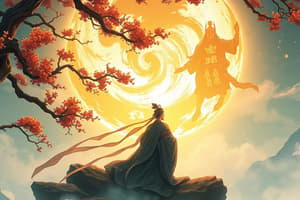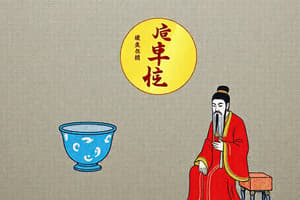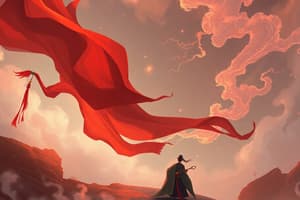Podcast
Questions and Answers
What is a primary area of divergence between philosophy and religion, according to the content?
What is a primary area of divergence between philosophy and religion, according to the content?
- Religion is neutral concerning transcendence, whereas philosophy centers on it.
- Both are concerned with knowledge of the world, but only philosophy addresses personal ethics.
- Philosophy emphasizes the individual; religion emphasizes the community. (correct)
- Both are ways of life, but only religion is concerned with what kind of person we ought to be.
What did Confucius believe was the primary cause of the political and social turmoil of his time?
What did Confucius believe was the primary cause of the political and social turmoil of his time?
- The inherent selfishness of human nature.
- The lack of established social hierarchies.
- The over-emphasis on ritual and tradition.
- The leaders' failure to follow the will of Heaven. (correct)
What role does the junzi play in Confucianism?
What role does the junzi play in Confucianism?
- A philosopher who debates the nature of goodness.
- A religious leader who interprets the will of Heaven.
- A role model who embodies moral behavior. (correct)
- A ruler who governs strictly by law.
Which of the following is the best description of ren in Confucian ethics?
Which of the following is the best description of ren in Confucian ethics?
In Confucianism, what is the primary expectation for the right side of each of the Five Relationships?
In Confucianism, what is the primary expectation for the right side of each of the Five Relationships?
How did Mencius differ from Confucius regarding human nature?
How did Mencius differ from Confucius regarding human nature?
What was Xunzi's perspective on human nature?
What was Xunzi's perspective on human nature?
What was Mozi's critique of Confucianism's Five Relationships?
What was Mozi's critique of Confucianism's Five Relationships?
What was the attitude of Maoist communism toward Confucianism?
What was the attitude of Maoist communism toward Confucianism?
How is the Chinese government's current relationship with Confucianism characterized?
How is the Chinese government's current relationship with Confucianism characterized?
Which of the following is the best translation of Xiao?
Which of the following is the best translation of Xiao?
According to the content, what is the main goal of Confucian teaching?
According to the content, what is the main goal of Confucian teaching?
According to the content, what makes Confucianism a religion?
According to the content, what makes Confucianism a religion?
Which of the following relationships is NOT one of the Five Relationships in Confucianism?
Which of the following relationships is NOT one of the Five Relationships in Confucianism?
According to the content, what is Li?
According to the content, what is Li?
Which of these statements best characterizes the criticism that the Five Relationships are 'not modern enough'?
Which of these statements best characterizes the criticism that the Five Relationships are 'not modern enough'?
What is the significance of 'The Analects'?
What is the significance of 'The Analects'?
What underlying assumption about human perfectibility differentiates Mencius and Xunzi and how does their disagreement impact their proposed governance structures?
What underlying assumption about human perfectibility differentiates Mencius and Xunzi and how does their disagreement impact their proposed governance structures?
Historical sources give us what level of detail about the life of Confucius?
Historical sources give us what level of detail about the life of Confucius?
Which action exemplifies the practical application of Xiao in a contemporary setting, reflecting its core principle while adapting to modern societal norms?
Which action exemplifies the practical application of Xiao in a contemporary setting, reflecting its core principle while adapting to modern societal norms?
Imagine a society where leaders consistently prioritize personal gain, disregard ethical conduct, and exploit their positions for self-enrichment. According to Confucian principles, what is the most likely consequence of such leadership?
Imagine a society where leaders consistently prioritize personal gain, disregard ethical conduct, and exploit their positions for self-enrichment. According to Confucian principles, what is the most likely consequence of such leadership?
During the Cultural Revolution, why did the Chinese Communist Party target Confucian scholars and religious practitioners?
During the Cultural Revolution, why did the Chinese Communist Party target Confucian scholars and religious practitioners?
Given the opposing views of Mencius and Xunzi, and assuming a ruler could only choose one to advise them, which advisor would be more beneficial in a society facing widespread corruption and distrust, and why?
Given the opposing views of Mencius and Xunzi, and assuming a ruler could only choose one to advise them, which advisor would be more beneficial in a society facing widespread corruption and distrust, and why?
How might Mozi have responded to contemporary China's use of 'Confucius Institutes' to promote its soft power abroad?
How might Mozi have responded to contemporary China's use of 'Confucius Institutes' to promote its soft power abroad?
Flashcards
Philosophy and Religion
Philosophy and Religion
A way of life concerned with knowledge of the world, the self, and what kind of person we ought to be.
Philosophy
Philosophy
Largely concerned with the individual.
Religion
Religion
Centered on the community.
Philosophy (transcendence)
Philosophy (transcendence)
Signup and view all the flashcards
Religion (transcendence)
Religion (transcendence)
Signup and view all the flashcards
Confucianism as a Religion
Confucianism as a Religion
Signup and view all the flashcards
Confucius' Teaching
Confucius' Teaching
Signup and view all the flashcards
Mandate of Heaven
Mandate of Heaven
Signup and view all the flashcards
Junzi (gentleman)
Junzi (gentleman)
Signup and view all the flashcards
Ren
Ren
Signup and view all the flashcards
Li
Li
Signup and view all the flashcards
Xiao
Xiao
Signup and view all the flashcards
Five Relationships
Five Relationships
Signup and view all the flashcards
Mencius' View of Human Nature
Mencius' View of Human Nature
Signup and view all the flashcards
Xunzi's View of Human Nature
Xunzi's View of Human Nature
Signup and view all the flashcards
Mozi's Criticism
Mozi's Criticism
Signup and view all the flashcards
Study Notes
- Confucianism is debated as either a philosophy or a religion due to both being "ways of life" that address knowledge and personal conduct
- Philosophy focuses on the individual, whereas religion emphasizes the community.
- Philosophy remains neutral on transcendence, while religion centers on realities beyond ourselves.
- Confucianism is regarded as a religion because it addresses the individual within their community, acknowledges supernatural beings, and accepts ritual practices.
- Confucius's philosophy underpinned Chinese education, culture, and religion for much of its history.
- Confucius lived approximately from 550 BCE to 480 BCE.
- Confucius unsuccessfully sought a government position and then became an educator.
- Confucius's teachings were recorded by his students, most famously in The Analects.
- Confucius aimed to teach and implement the will of Heaven.
- Social disorder stemmed from leaders not following Heaven.
- Heaven's mandate requires government to rule by virtue, serving as a social model.
- Human nature is inherently good, but must be activated.
- Goodness is initiated through role models, especially the gentleman (junzi).
- The junzi does what is right, matches words to deeds, and is aware of their moral failings.
- Junzi status is gained by observing and imitating those of higher social status.
- Confucian ethics are based on obligations to others, emphasizing one’s role in a network of relationships.
Key Terms
- Ren: Benevolence, Confucianism’s Golden Rule, defining true nobility.
- Li: Respect for tradition, proper ritual action, "doing things the right way."
- Xiao: Filial piety, obedience to parents and ancestors, reflecting a hierarchical society.
The Five Relationships
- Political: Ruler-minister.
- Domestic: Father-son, husband-wife, elder brother-younger brother.
- Social: Elder friend-younger friend.
- Proper alignment of these relationships leads to societal flourishing and order.
- Those on the right side of each pairing should defer to those on the left, like a son to his father.
Mencius
- The foremost interpreter of Confucius, expanded on his ideas in The Analects
- Human nature is inherently good, corrupted only by environment.
- Government should supply for basic needs, and social order will allow goodness to emerge.
Xunzi
- Lived two centuries after Confucius
- Human nature is inherently selfish, needing societal constraints.
- Social norms within the Five Relationships turn people towards good, curbing materialistic and ignorant impulses.
Mozi
- Criticized the Five Relationships for limiting love and respect, leading to corruption.
- He thought emphasis on expensive ritual and sacrifice was wasteful.
- He believed the ideal of the junzi lacked real-world impact.
Confucianism
- Shaped Chinese education, government, and ethics until the 19th century,
- Educated Chinese people in the past two centuries viewed Confucianism as hindering political and economic progress.
- The Five Relationships were deemed not modern enough.
- Maoist communism in the 1940s viewed Confucianism as backward.
- Confucian ethics, prioritizing family over state, were opposed by Mao.
- Many Confucian scholars, along with religious practitioners, were killed during the Cultural Revolution (1966-1969).
Modern Shift
- The Chinese government's view of Confucianism has shifted.
- Confucianism is now seen as social glue and a source of civic virtue, accelerating East Asian prosperity, particularly in China.
- The Five Relationships have been revived as a measure of tradition in a rapidly changing world.
- Confucianism emphasizes order, balance, and harmony, providing an antidote to social disparities and tensions.
- It supplies an ideology that teaches people to accept their place without challenging party rule.
- As a home-grown ideology, it is different from communism
- The party uses "Confucius Institutes" to promote soft power abroad.
Studying That Suits You
Use AI to generate personalized quizzes and flashcards to suit your learning preferences.




